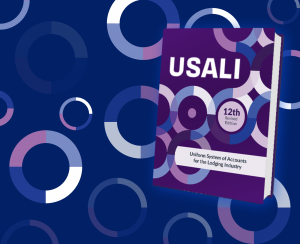In the hospitality industry, particularly in hotels, managing finances accurately is paramount to success. With intricate operations and various revenue streams, hotels need a solid financial framework to ensure efficiency, transparency, and profitability. This is where the Uniform System of Accounts for the Lodging Industry (USALI) and a well-structured chart of accounts (COA) come into play. Let’s explore why they are vital for any hotel.
What is the Uniform System of Accounts for the Lodging Industry (USALI)?
The USALI is a standardized accounting framework specifically tailored for the lodging industry. First introduced in 1926 and now in its 12th edition, USALI provides a detailed, uniform structure for categorizing financial information. It ensures that hotels, from small boutique properties to large multinational chains, can report and interpret their financials consistently.
Key Benefits of Using USALI in Hotels
- Consistency Across the Industry: USALI establishes a common language for financial reporting across the lodging industry. This uniformity means hotel owners, managers, and investors can easily compare financial data between properties or against industry benchmarks. Whether you’re managing a luxury boutique hotel or a full-service resort, adhering to USALI ensures your financial reports are consistent and aligned with industry standards.
- Improved Financial Decision-Making: With standardized financial reports, hoteliers can make more informed decisions. Whether it’s optimizing staffing levels, adjusting room rates, or evaluating the profitability of ancillary services like restaurants or spas, USALI’s detailed breakdown of revenue and expense categories provides hotel operators with the granular data they need to drive operational improvements.
- Enhanced Benchmarking and Performance Analysis: By adopting USALI, hotels can easily benchmark their performance against industry peers. It becomes easier to assess key performance indicators (KPIs) like gross operating profit (GOP), revenue per available room (RevPAR), and labor costs. This allows hotels to identify areas for improvement and track performance against the competition or industry averages.
- Transparency for Stakeholders: Transparency is crucial for investors, owners, and stakeholders who want to understand how the hotel is performing financially. USALI provides clear, detailed reporting that stakeholders can trust. It removes ambiguities from financial reports and ensures all parties have a clear understanding of the hotel’s financial health.
The Role of a Proper Chart of Accounts (COA) in Hotel Operations
A chart of accounts (COA) is the backbone of any accounting system. It organizes all financial transactions into specific categories and codes. A well-designed COA is essential for accurate financial tracking, reporting, and analysis. In hotels, the COA needs to reflect the complexity of the business, which may have various revenue sources (rooms, food and beverage, events) and expense categories.
Key Advantages of Using a Proper COA
- Detailed Financial Insights: A properly structured COA provides detailed insights into every financial aspect of the hotel. For instance, it breaks down room revenue, food and beverage income, and other sources separately. This granularity helps hotel managers understand which areas are driving revenue and which may need improvement.
- Accurate Financial Reporting: With a clear COA, financial reports are more accurate and precise. Errors are minimized, and there’s a clear trail for every transaction. This ensures that the hotel’s profit and loss (P&L) statements, balance sheets, and cash flow reports are reliable and trustworthy.
- Simplified Audits and Compliance: A well-organized COA simplifies the audit process. Auditors can easily follow the financial trail and verify transactions. For hotels operating in multiple jurisdictions, a COA aligned with USALI also helps ensure compliance with local and international financial regulations.
- Flexibility for Growth: As hotels grow and evolve, their financial needs may change. A flexible COA can be easily expanded to accommodate new revenue streams, additional departments, or different ownership structures. This adaptability ensures that the hotel’s financial framework can scale alongside its operations.
How USALI and a Proper COA Work Together
While USALI provides a uniform structure for categorizing financial data, a proper COA allows hotels to implement this framework effectively. The COA maps the financial transactions into the categories defined by USALI, ensuring that reporting aligns with industry standards. Together, they create a seamless financial management system that boosts efficiency, accuracy, and transparency.
For example, USALI might define specific categories for room revenue or payroll expenses. The COA will break these categories down further, allowing for precise tracking of different market segments or meal periods or labor costs in different departments (housekeeping, front desk, restaurant, spa). This level of detail is crucial for effective financial management in hotels.
Conclusion
In today’s competitive hospitality industry, financial management is more complex than ever. The Uniform System of Accounts for the Lodging Industry (USALI) and a properly structured chart of accounts (COA) are essential tools for ensuring consistency, transparency, and informed decision-making. Hotels that adopt these frameworks benefit from clearer insights, better performance benchmarking, and enhanced trust with stakeholders.
By leveraging the USALI and an effective COA, hoteliers can focus on what matters most—delivering exceptional guest experiences—while maintaining a strong financial foundation.
If you need assistance implementing USALI or setting up a proper chart of accounts for your hotel (s), Hotel Finance Partners provide tailored solutions that streamline financial operations and help you achieve your business goals. Contact us today to learn how we can support your hotel’s financial success.


Recent Comments